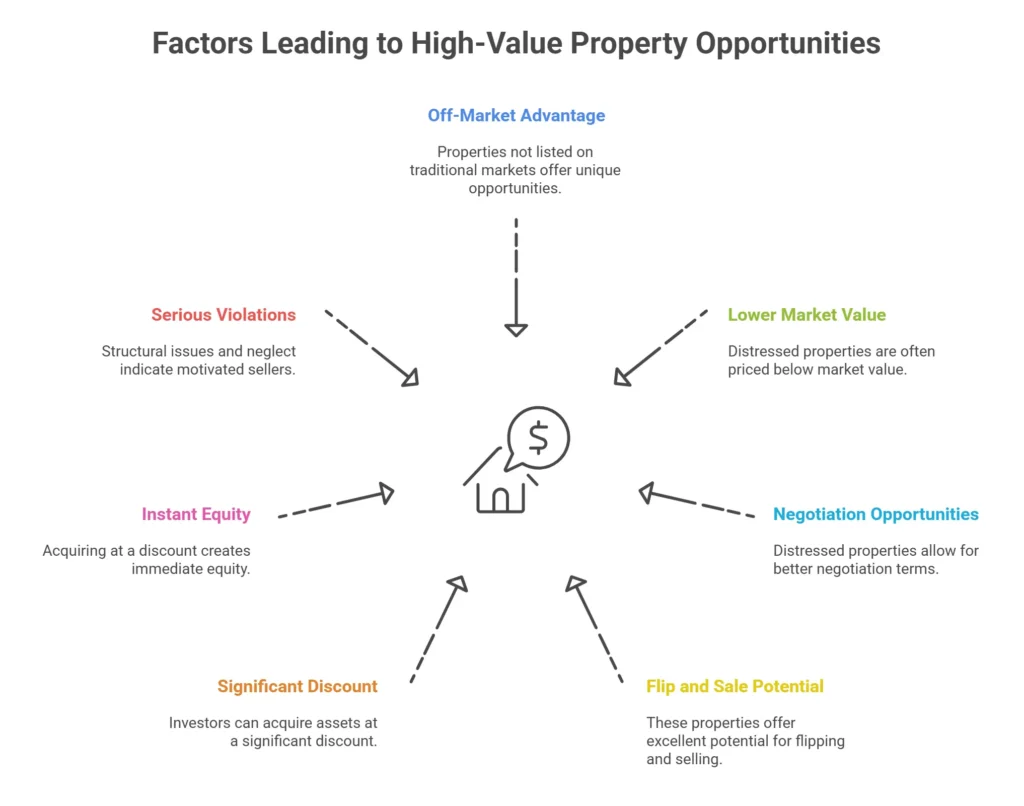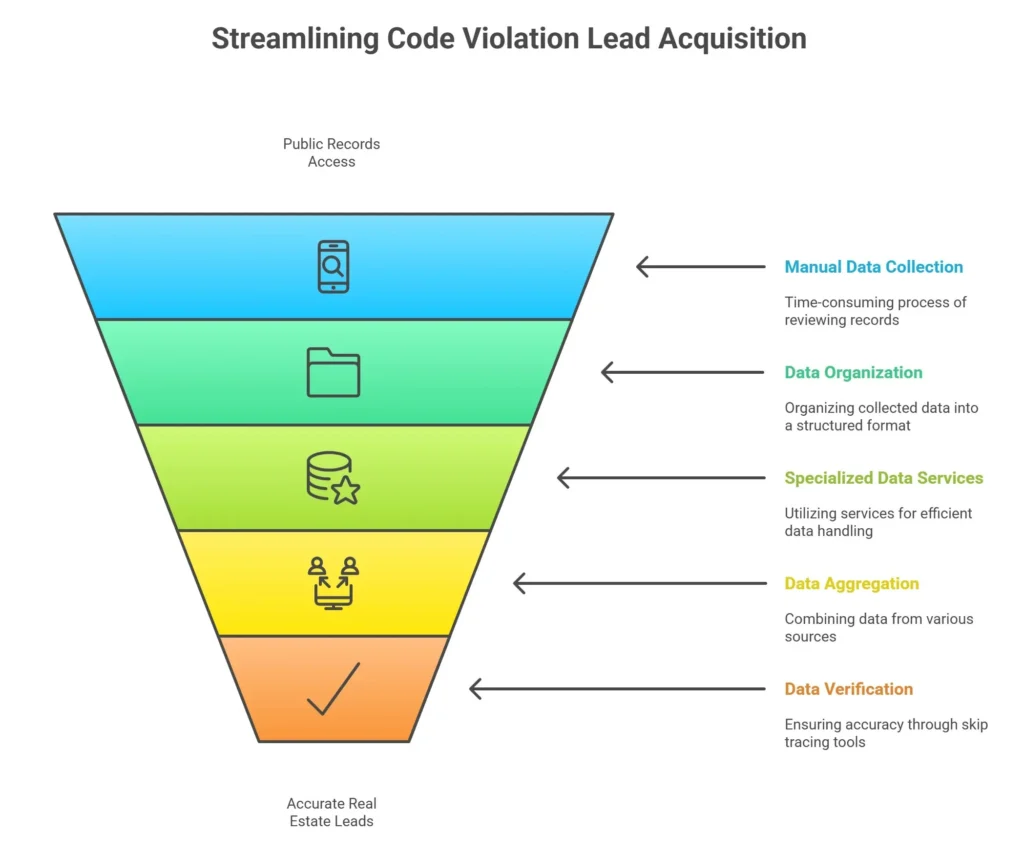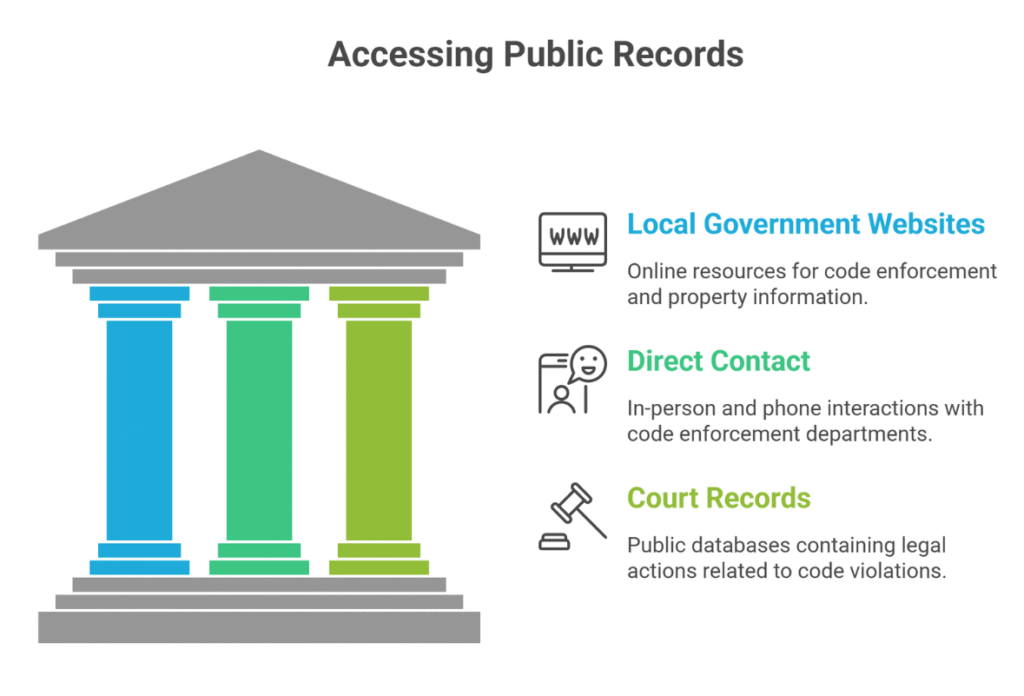Are you tired of fighting for the same MLS listings as every other investor?
The most lucrative opportunities in real estate are often the ones no one is looking for. That’s where code violation properties come in. These are the off-market deals hiding in plain sight, flagged by local municipalities and ripe with potential.
A code violation isn’t just a repair—it’s a clear signal of a motivated seller who is ready to negotiate.
This guide will show you how to find these hidden gems, connect with owners, and turn their problems into your profits.
Why Should Code Violation Properties Be On Your Radar?

The Untapped Potential of Distressed Assets
Code violation properties are valuable because they present an off-market advantage that bypasses the bidding wars of traditional listings.
A property with a violation is often a sign of distress, which can lead to it being lower than market value, has better negotiation opportunities, and offers excellent flip and sale opportunities.
Investors who specialize in this niche can acquire these assets at a significant discount, creating instant equity.
Indicators of High-Value Opportunities
Not all code violations are created equal. Savvy investors learn to differentiate between minor issues and those that signal a truly distressed property.
While a small cosmetic violation might not indicate a motivated seller, more serious violations—such as structural issues, severe neglect, or unpermitted additions—are often red flags that the homeowner is overwhelmed and a prime candidate for a quick sale.
While these properties may require significant repairs, they offer a higher potential for profit and a clearer path to a mutually beneficial deal.
Where Can You Unearth Code Violation Leads?

Leveraging Public Records and Municipal Departments
Finding code violation properties and their owners from public and free sources often involves diligent local research, as the data is usually decentralized at the municipal or county level.
Here’s a breakdown of where and how you can typically find this information:
Local Government Websites (City/County)
Code Enforcement or Building Department
Most cities and counties have a Code Enforcement or Building Department website. This is your primary resource.
Online Search Portals
Many jurisdictions offer online portals where you can search for code violations by property address. Look for sections like Code Enforcement Records, Property Search, Permit Search, or Violations.
Public Records Request
If an online portal isn’t available or doesn’t provide enough detail, you might need to submit a formal public records request (sometimes called a FOIA request in the US) to the relevant department.
Contact Information
These sites will also list contact numbers for the Code Enforcement office. A friendly call to an officer or clerk can sometimes provide valuable insight or guidance on how to access the records.
Property Assessor’s/Tax Collector’s Office
Once you have a property address with a code violation, you can typically use the local property assessor’s or tax collector’s website to find the owner’s name and mailing address. This information is almost always public record.
GIS (Geographic Information System) Portals
Many counties provide public access to their GIS databases. These mapping tools often overlay property information, including ownership, tax data, zoning, and sometimes even links to code violation records or permits.

Direct Contact with Code Enforcement Departments
In-Person Visits
Visiting the local code enforcement office in person can be very effective. Clerks can often guide you through their systems or provide direct access to public terminals.
Phone Calls
A polite call can get you information or direct you to the right online resources or forms. Be specific about the type of information you’re looking for (e.g., active code violations for X address, list of properties with unresolved violations).
Online Complaint Portals
Many cities have online portals (e.g., 311 services, Report a Violation forms) where citizens can report code violations. While these aren’t designed to give you lists of properties, if you’re researching a specific property, you might be able to see if complaints have been filed.
Court Records
If a code violation leads to fines, liens, or court action, the records might appear in local municipal or county court databases.
These are typically public records, but navigating them can be more complex.
Unpaid fines for code violations can sometimes result in a lien being placed on the property, which would show up in a title search.
 Pro Tips:
Pro Tips:
- Always begin your search with the specific city or county where the property is located. Code violation records [City/County Name] is a good starting point for a search.
- The more information you have (address, parcel number), the easier it will be to find records.
- Code violation data is dynamic. New violations are issued, and old ones are resolved. For a consistent flow of leads, you’d need to regularly check these sources.
How Can You Effectively Vet and Connect with Property Owners?
Beyond the Violation: Initial Due Diligence
After identifying a potential lead, the work is far from over. Successful investors move beyond the violation itself and conduct initial due diligence to assess a property’s true potential.
This includes researching the property’s history, neighborhood trends, and comparable market values to make “Data-driven decisions” about its viability. This step is critical to ensure you’re pursuing opportunities with a high probability of profit.
The Critical Role of Accurate Contact Information
Even with a high-potential property identified, the process stalls without a way to contact the owner.
The Need for accurate contact information (skip tracing) is a key pain point for real estate professionals in this niche. Finding reliable homeowner and seller information is crucial for effective outreach.
Services with robust skip tracing capabilities, which use multiple skip tracing tools to ensure data accuracy, are essential for success. This reliable data helps you easily connect with genuine leads and close deals efficiently.
Crafting an Effective Outreach Strategy
With accurate data in hand, you can begin a targeted outreach strategy using proven prospecting methods like cold calling and direct mailing.
When you approach these sellers, it’s vital to do so with a Client-centric and problem-solving mindset. Remember that they may be in a difficult situation.
Approaching them with empathy and a genuine desire to help find a solution can make all the difference, leading to more successful negotiations and deals.
How Can Technology and Delegation Drive Your Success?
Streamlining Your Workflow with Productivity Tools
Today’s real estate professional is digitally savvy and always looking for Productivity tools to optimize their workflow.
Leveraging CRM systems, email campaign platforms, and other communication tools can help you manage your leads, automate follow-ups, and ensure no opportunity falls through the cracks.
These tools are the backbone of an efficient, scalable operation.
Empowering Your Business with Virtual Assistants
A common challenge for real estate professionals is the Lack of time for admin/sales tasks.
Delegating routine responsibilities to VA teams who are experienced in real estate procedures can dramatically save time and increase your overall efficiency.
VAs can handle a wide range of tasks, from managing listings and sales procedures to performing essential phone, SMS, and email outreach. You can focus on high-value activities like closing deals.
Integrating Code Violation Leads for Sustained Growth
Building a Diverse Lead Pipeline
Code violation leads should be a valuable component of a diversified lead generation strategy.
They naturally complement other distressed property types like probates, FSBOs, divorce properties, foreclosures, and preforeclosures, building a robust and consistent pipeline of off-market deals.
A consistent flow of these opportunities is key to sustained business growth.
Maximizing Your Return on Investment
Ultimately, the goal is to maximize your returns. The ROI-focused benefits of strategically pursuing code violation properties are clear.
By using the right data, tools, and approach, these hidden gems can consistently yield profitable flip and sale opportunities and help you build a thriving real estate business.
FAQs
What specific types of code violations are most indicative of a motivated seller?
Generally, violations related to health, safety, or major structural issues (e.g., foundation problems, unpermitted additions, severe neglect) are stronger indicators of distress and a highly motivated seller than minor cosmetic issues.
How accurate is the contact information for code violation property owners when using specialized data services?
Specialized data services like ours achieve high accuracy by running raw data through multiple skip tracing tools. This process cross-references information to ensure the contact details are reliable, which is crucial for effective outreach.
Can a virtual assistant truly manage the entire outreach process for code violation leads?
Yes, VAs with real estate experience can manage a significant portion of the outreach process, from initial cold calling and direct mailing to lead follow-up and appointment setting, freeing you to focus on deal negotiation and closing.
Are code violation properties always significantly cheaper than market value?
While they often sell for less than market value due to their distressed nature and the seller's motivation, the exact discount depends on the severity of the violation, the extent of required repairs, and the seller's urgency.
How do code violation leads compare in terms of risk and reward to other off-market property types like foreclosures or probates?
Code violation leads can present a unique balance of risk and reward. They may require more hands-on work and due diligence to assess the property's condition, but they often face less competition and offer a clearer path to a motivated seller than more legally complex processes like foreclosures or probates.
Conclusion
Unlocking the hidden value in code violation properties can be a transformative strategy for any real estate professional.
By understanding the opportunities, overcoming the challenges, and leveraging the right tools and support, what once seemed like a complex process becomes a streamlined, profitable venture.
With accurate and actionable real estate lead data and efficient support from VA teams and multiple skip tracing tools, you can easily connect with these hidden opportunities. By adopting a data-driven approach, you are not just finding deals; you are building a robust and resilient pipeline for sustained business growth.
So, are you ready to start your treasure hunt? REI Data Solutions helped realtors and investors find code violation properties in the US and Canada. If you are looking for verified property list data, drop a message here.




